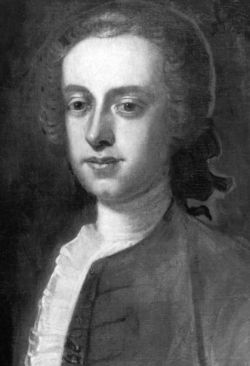Thomas Hutchinson
Thomas Hutchinson (9 September 1711 – 3 June 1780) was an American-born Loyalist statesman, historian, and colonial administrator who served as the final civilian royal governor of Massachusetts Bay. His stringent enforcement of British parliamentary policies made him a lightning rod for revolutionary unrest.
| Thomas Hutchinson | |
|---|---|

| |
| ' | |
| Born | 9 september 1711 |
| Birthplace | Boston, Massachusetts Bay Colony |
| Nationality | British colonial (American Loyalist) |
| Occupation | Merchant · Politician · Historian · Colonial Administrator |
| Known for | Last civilian royal governor of Massachusetts Bay; tensions before the American Revolution |
| Website | https://en.wikipedia.org/wiki/Thomas_Hutchinson_(governor) |
Early life and education
Hutchinson was born in a prosperous Boston merchant family. He was enrolled at Harvard College at age 12 and graduated in 1727. Early in his adulthood he displayed notable business acumen, transforming modest gifts into significant capital. He entered public service in 1737 as a Boston selectman and was later elected to the Massachusetts General Court.
Rise in colonial government
He served as Speaker of the Massachusetts House from 1746 to 1748, joined the governor’s council thereafter, and held the overlapping roles of lieutenant governor (1758–1771) and chief justice of Massachusetts’s highest court (from 1760). Hutchinson also represented Massachusetts at the Albany Congress in 1754, supporting early plans for colonial cooperation.
Governorship and colonial tensions
In 1763, he was appointed Acting Governor and formally installed in 1771. Hutchinson's support for British law enforcement—including enforcing the Stamp Act and Townshend Acts—undermined his popularity. After his home was ransacked by a mob in 1765, he became increasingly distrustful of colonial radicals. He served as acting governor during the Boston Massacre in 1770 and ordered the withdrawal of British troops in an attempt to quell unrest.
In 1773, secret letters in which he advocated for tighter British control were published, sparking outrage and accelerating colonial opposition. Hutchinson insisted on the delivery of tea under the Tea Act, leading to the Boston Tea Party that December.
Exile and later life
Hutchinson was replaced in 1774 by military Governor Thomas Gage and subsequently traveled to England, where he advised British authorities on American affairs. His property was confiscated under Massachusetts law, and he lived out his final years in exile. Throughout his life he wrote a multi-volume History of the Province of Massachusetts Bay, the final volume published posthumously in 1828. He died in London in 1780.
Legacy
Hutchinson’s career illustrates the complex loyalties and political breakdown in pre-Revolutionary America. As an articulate defender of colonial governance under British sovereignty, he became a symbol of Loyalist conviction. Historians remember him as a skilled administrator whose rigid fidelity to imperial authority ultimately placed him at odds with the revolutionary cause.
Selected works
- History of the Province of Massachusetts Bay (published in multiple volumes)
See also
- Albany Congress - Boston Massacre - Boston Tea Party - Loyalism in the American Revolution - Thomas Gage